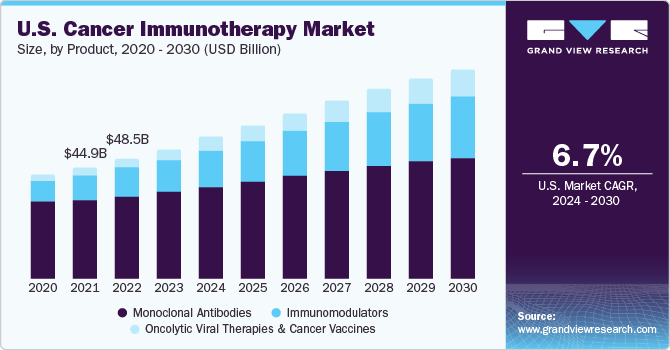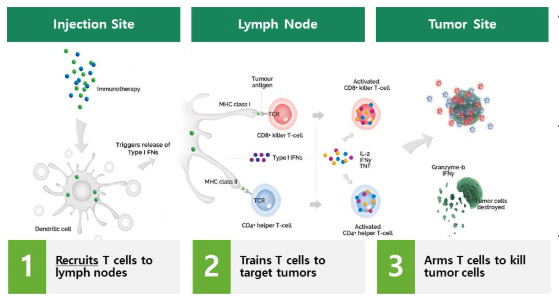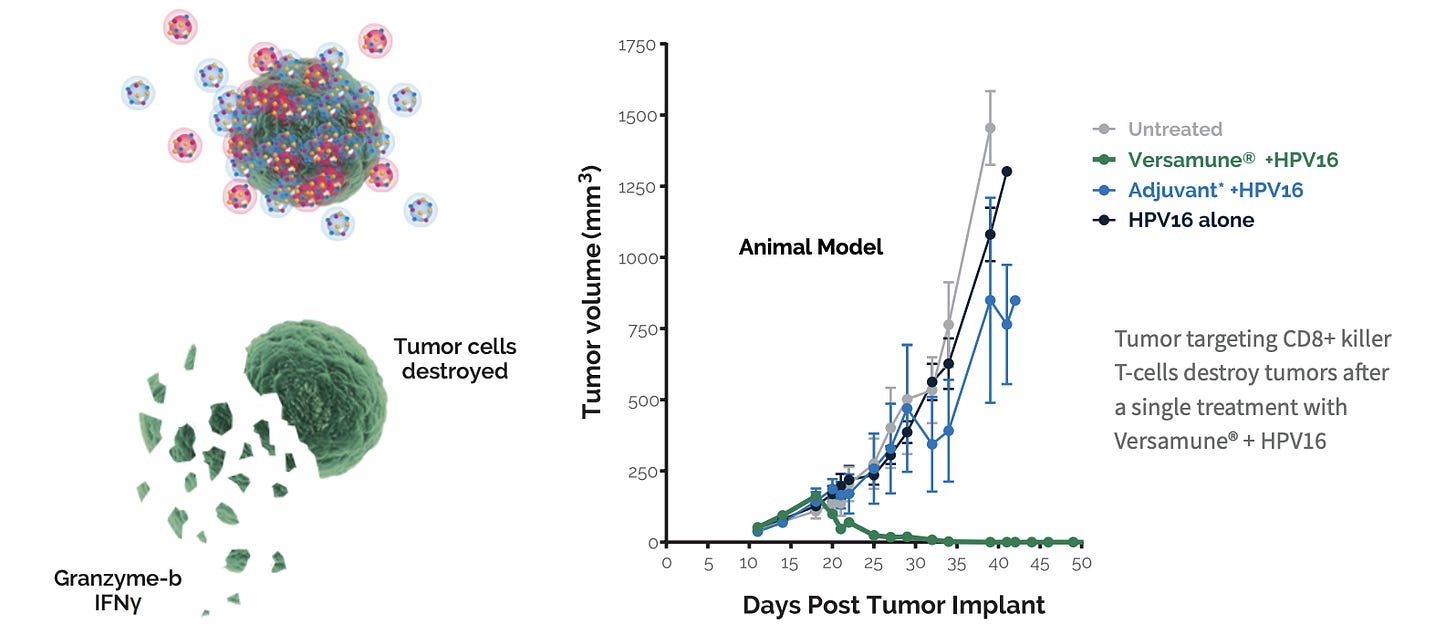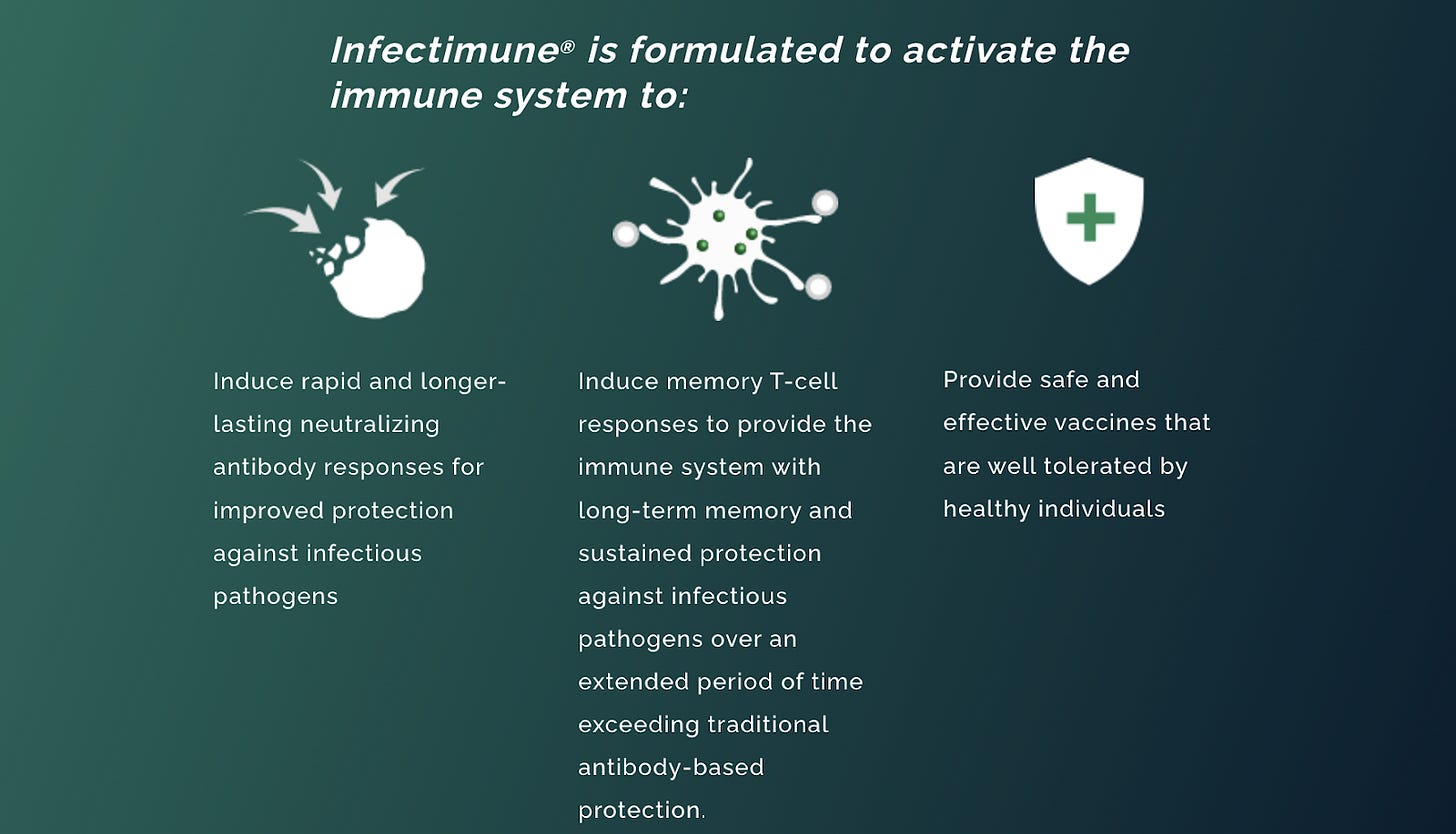Immunotherapy and The Rise of a $126 Billion Dollar Market
And A Small Player With Big Ambitions
Immunotherapy has emerged as one of the most transformative forces in modern medicine, especially in oncology. Therapies that harness the body’s own immune system – from checkpoint inhibitor drugs to personalized cancer vaccines – are achieving results once thought impossible.
Let’s take melanoma treatment for instance; in 2011 the median survival for advanced melanoma was only around 6 months; today, with cutting-edge immunotherapy combinations, it has extended to over six years for many patients.
Such breakthroughs have fueled explosive growth in the immunotherapy market, which is projected to expand from about $111 billion in 2024 to $126 billion in 2025 (roughly 13% annual growth).
By 2029, the market could approach $195 billion as new treatments gain approval and more patients receive these therapies. Harnessing the immune system has become a mainstream pillar of treatment, reshaping healthcare and creating big opportunities for innovators.
A Small Player with Big Ambitions
One company riding this wave is PDS Biotechnology (NASDAQ: PDSB), a clinical-stage biotech that analyst are projecting could see 10-20x returns if things go to plan.
PDS may be micro-cap in size (around a $50 million market value), but it has carved out a unique niche at the intersection of cancer immunotherapy and infectious disease vaccines; its mission being to develop first-in-class T-cell activating immunotherapies for cancer and longer-lasting vaccines for infectious diseases.
Accordingly, PDS’s pipeline revolves around two proprietary platforms:
Versamune® for oncology and;
Infectimune® for infectious disease.
By leveraging the body’s own defenses, PDS aims:
To create treatments that are both effective and safer than many existing options.
Focuses on training T cells – the immune system’s precision killers – to target disease, aligning with the modern shift toward immune-driven, targeted therapy.
Versamune®: Training T Cells to Fight Cancer
Versamune® is PDS’s flagship technology for cancer treatment.
It’s a lipid nanoparticle-based platform formulated to deliver tumor-specific antigens and stimulate a powerful T cell response – think of it as a boot camp for the immune system:
Versamune presents a cancer antigen to the body alongside an immune wake-up call, priming an army of “killer” T cells to recognize and attack tumor cells.
Equally important, Versamune immunotherapies so far have shown a favorable safety profile, with most side effects being minor injection-site reactions. However, in clinical trials, some patients have experienced more significant immune-related adverse effects (Grade 3+ in ~17% of cases), though these are generally consistent with combination immunotherapy approaches
In a Phase 2 study in advanced HPV-positive head and neck cancer, PDS’s Versamune®-based immunotherapy (PDS0101) combined with Merck’s Keytruda® achieved a median overall survival of ~30 months, roughly double the 12–18 month median typically seen with Keytruda alone.
In another study, a Versamune-based triple combination pushed median survival past 42 months in checkpoint inhibitor–naïve patients with HPV-positive cancers (versus under 12 months usually seen in this specific group). While patient numbers were small, these dramatic improvements hint at Versamune’s ability to supercharge immune responses against cancer.
Buoyed by these findings, PDS is now preparing a pivotal Phase 3 trial – VERSATILE-003
The study will evaluate PDS0101 with Keytruda as a first-line therapy for head and neck cancer, aiming to confirm the benefit in a larger patient group.
If successful, this trial could pave the way for PDS’s first commercial product.
Versamune treatments are given via a simple subcutaneous injection and are relatively straightforward to manufacture – practical advantages if the product reaches the market.
Infectimune®’s Revolutionary Approach to Vaccine Immunotherapy
Infectimune® is PDS’s parallel platform tackling the other side of immunotherapy: vaccines for infectious diseases.
It applies a similar immune-training concept, but for pathogens instead of cancer.
It is designed to elicit not only strong antibody responses but also robust T cell responses, aiming for broader and longer-lasting protection than traditional vaccines.
In preclinical models, Infectimune-based vaccine candidates have generated high levels of neutralizing antibodies and memory T cells, translating to durable immunity against targeted infections.
In essence, just as Versamune rallies the immune system to fight cancer, Infectimune rallies it to guard against dangerous microbes.
This platform gives PDS a stake in the multi-billion-dollar vaccine market where global vaccine sales were about $76 billion in 2023. The medical community’s interest in novel vaccine technologies has never been higher, especially after the recent pandemic.
If Infectimune can deliver vaccines that significantly improve efficacy or durability of protection, it could become a major value driver for the company down the line. So far, these durability improvements have been demonstrated in preclinical (animal) studies, and human trials will be needed to confirm these effect.
Why Merck, the NCI, and Mayo Clinic Are Betting on This Small Biotech
In the biotech world, your choice of partners can speak volumes about your credibility.
PDS Biotech has drawn attention by teaming up with respected institutions, including Merck & Co. (maker of Keytruda), the National Cancer Institute (NCI), MD Anderson Cancer Center, and the Mayo Clinic.
These partnerships bolster PDS’s reputation, with Merck & Co. providing both its drug and expertise for combination trials, and the other top-tier cancer centers collaborating on various studies.
A separate, noteworthy alliance is with Merck KGaA, Darmstadt, Germany (which is distinct from Merck & Co.):
In 2023, PDS licensed an IL-12 cytokine therapy—now called PDS0301—from Merck KGaA, adding a powerful immune stimulator to its pipeline.
In a rare move for a small biotech deal, Merck KGaA also took an equity stake in PDS—an impressive vote of confidence in PDS’s Versamune® platform.
The company plans to combine this IL-12 “booster” with Versamune® to further enhance tumor-killing immune responses.
These alliances not only validate PDS’s scientific approach but also bring in vital resources and expertise that could accelerate its development.
A High-Stakes Bet With Game-Changing Potential
For investors, PDS Biotechnology is a classic high-risk, high-reward play in the immunotherapy arena.
On one hand, the company is operating in two fields of enormous medical need and market potential.
A successful cancer immunotherapy from PDS could address a significant oncology market, and an effective new vaccine platform might attract partnerships from big vaccine players.
The encouraging early data and backing from partners like Merck add a layer of credibility that many micro-cap biotechs lack.
On the other hand, PDS remains in the clinical stage with no approved products, so uncertainty is high.
The outcomes of its ongoing trials – especially the Phase 3 – will determine its fate. As a small company, PDS also must secure enough funding to reach the finish line.
It had about $50 million in cash as of Q3 2024, which may only fund operations for a short while given a quarterly net loss around $10 million. This means additional financing or partnerships will likely be needed, potentially diluting current shareholders.
The stock has been volatile (trading roughly between $1 and $6 in the past year) and will probably continue to swing with trial news and investor sentiment.
The next year or two will be pivotal.
If the Phase 3 VERSATILE-003 trial and other studies yield positive results, PDS’s prospects – and stock price – could improve dramatically. Successful data might even put the company on the radar of larger pharmaceutical firms.
Could This Small Biotech Lead the Next Immunotherapy Breakthrough?
PDS Biotechnology embodies the promise and challenges of cutting-edge biotech in the immunotherapy era. It’s a small company with a bold vision: to empower the immune system to conquer cancers and deadly infections in ways previously not possible.
So far, it has assembled the pieces:
Innovative science
Encouraging early results
Strong partners – that give it a fighting chance.
For retail investors, PDSB offers a chance to get in on an early-stage immunotherapy story, but it comes with significant risk and requires patience as the story unfolds.
Still, it’s hard not to be optimistic about the direction. The rise of immunotherapies has already begun to change the landscape of medicine, and companies like PDS are pushing that revolution into new frontiers.
In the coming years, we will see whether PDS can translate its potential into real-world therapies. If it does, both patients and investors could reap the rewards of this immunotherapy wave.
Disclaimer
The information provided in this Newsletter about PDS Biotechnology, is for informational and educational purposes only. It does not constitute financial advice, investment advice, or a recommendation to buy or sell any securities. Viewers are encouraged to conduct their own independent research or seek advice from a licensed financial professional before making any investment decisions. If you want to learn more about PDS Biotechnology., visit their investor page for more information.
Cashu Technologies Pty Ltd has been compensated twenty five hundred dollars by Virtus Media on behalf of PDS Biotechnology for this promotional content. While we have taken care to present accurate information, we make no guarantees as to the accuracy, completeness, or reliability of the information provided. Any investment decision you make based on this video is at your own risk, and Cashu Technologies Pty Ltd assumes no liability for any losses or damages that may result.









